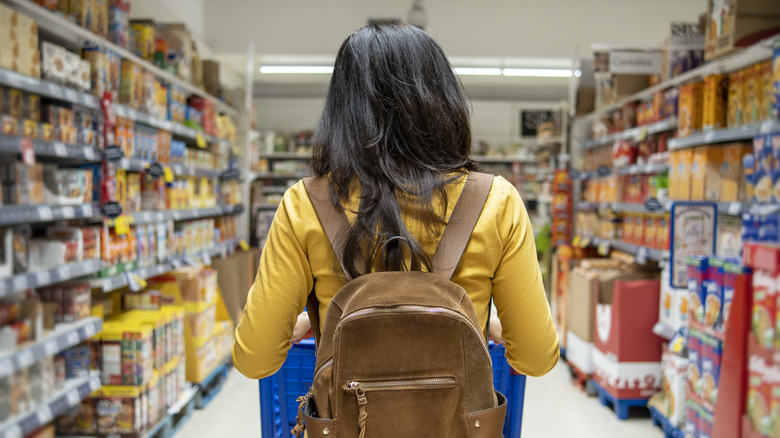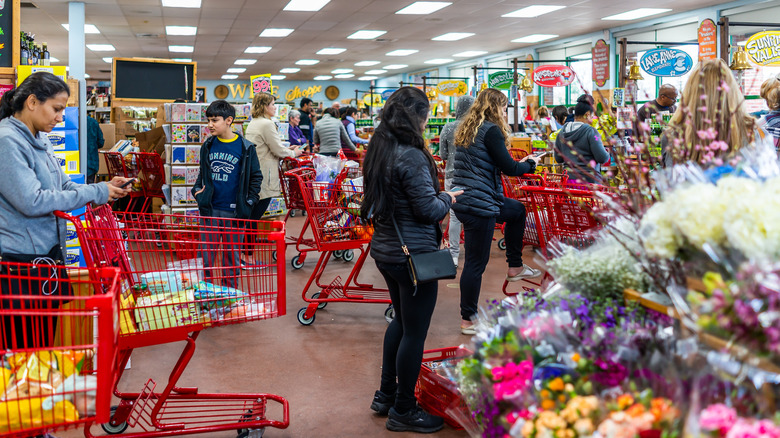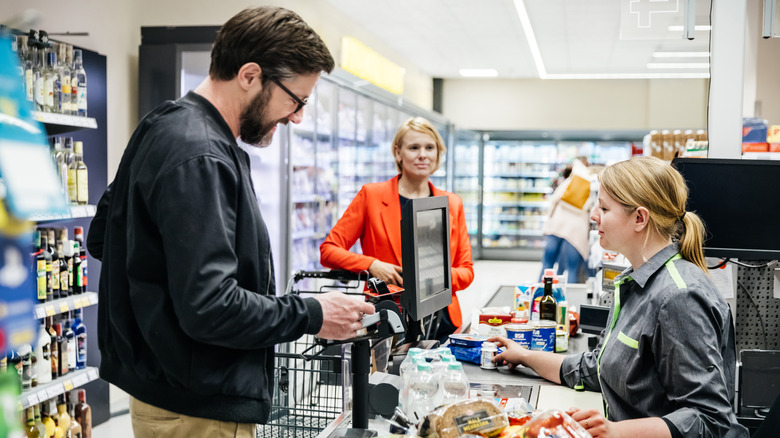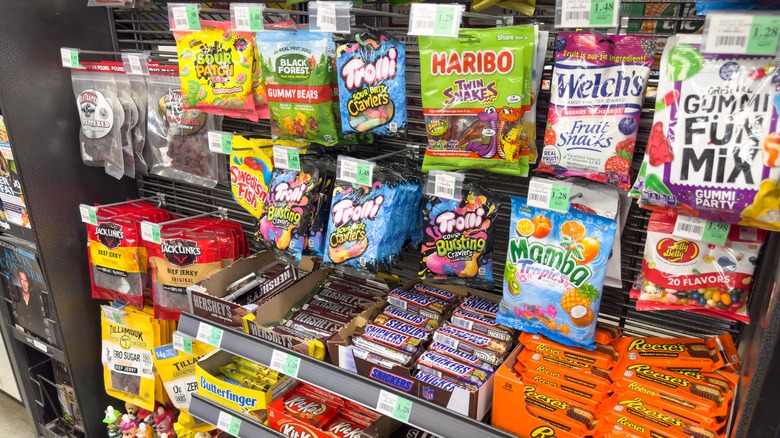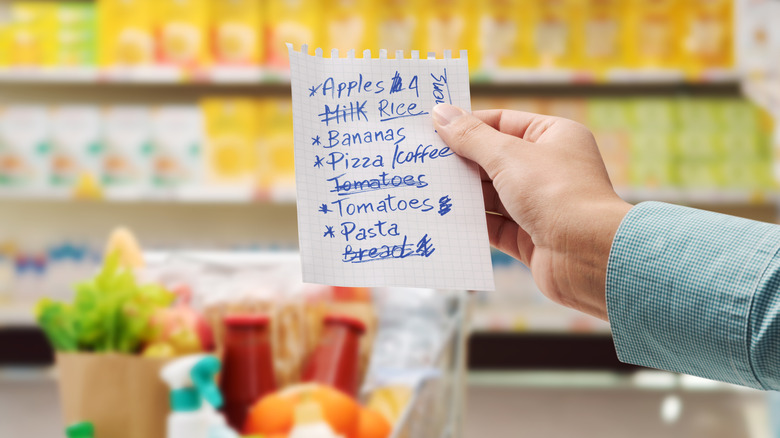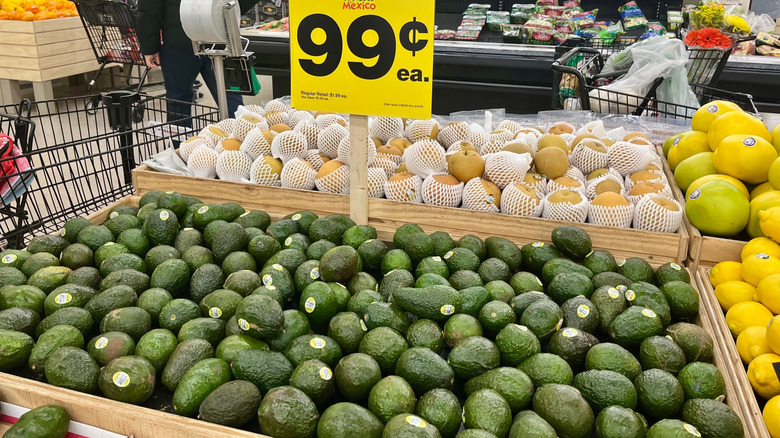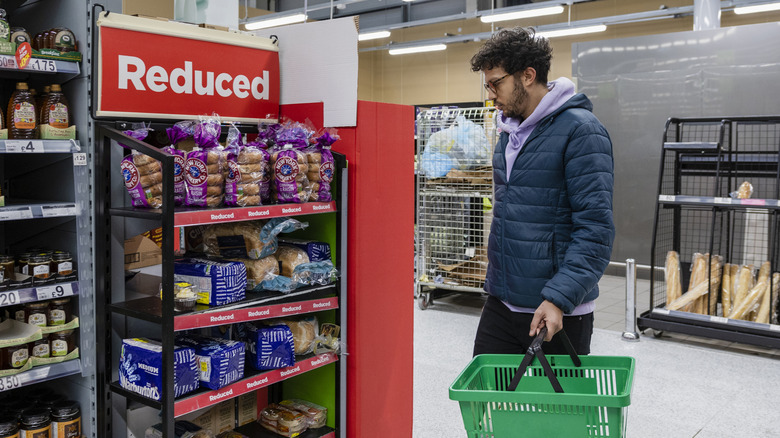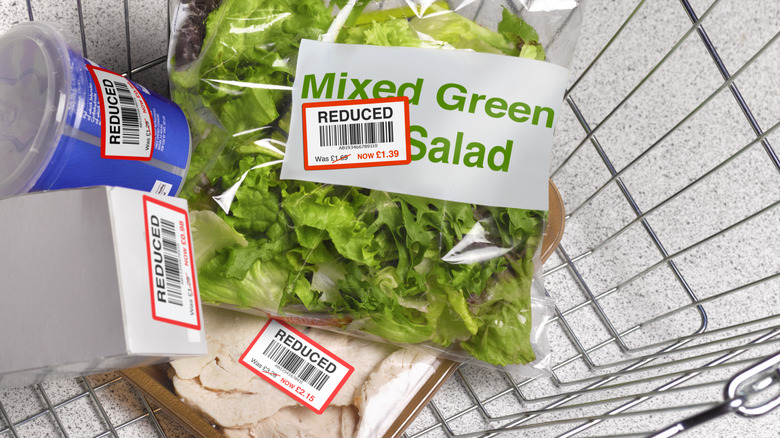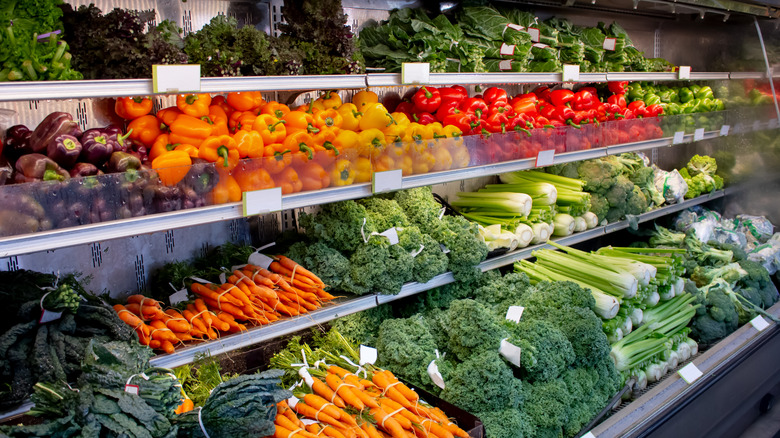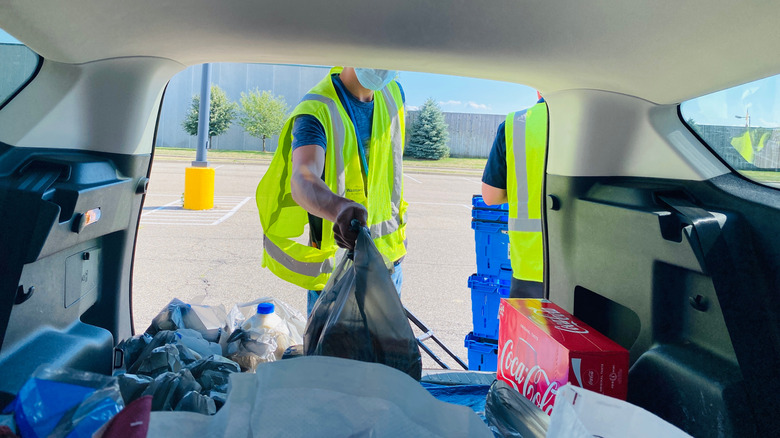11 Reasons You Should Do Your Grocery Shopping Midweek
For many of us, grocery shopping falls in the same category as paying taxes, pumping gas, and going to the dentist. No one is thrilled about the task, but we do it because we have to. When it comes to grocery shopping, choosing which day of the week to get it done can really make a difference on your wallet and your sanity.
It is probably no surprise that Saturdays between 10 a.m. and 2 p.m. is typically the most popular time to shop for groceries in the United States. This is, therefore, the very best time not to go to the grocery store. If you can't avoid a Saturday grocery run, you might be better off doing your shopping first thing in the morning before the crowds roll in, or in the evening before the store closes. Stores fill up on Sundays, too, especially after church hours, and Fridays also end up being crowded with people stopping by after work to get their shopping done before the weekend rush.
Whether you are a weekday warrior or weekend shopper, choosing the right time can make all the difference. Early mornings and late evenings tend to be the calmest, no matter the day you go shopping. But midweek days like Tuesday and Wednesday are often your best bet for a smoother, faster, and less stressful shopping experience. Here are reasons why you should do your grocery shopping midweek.
You'll avoid crowds
While Saturday draws the largest crowd, grocery stores on a Saturday or Sunday are nearly as packed with people as Walt Disney World is at Christmas (you get our drift). But midweek, the grocery crowds are reduced; in fact, Tuesday mornings are the least crowded time to grocery shop. If you are unsure which days and times are most crowded at your chosen grocery store, ask the manager, or Google. That is right: A location search on Google or in Google Maps displays the store hours, plus it shows a chart of the busiest days and times, along with a live feed of current crowd size so you know when to avoid rush hour and plan your shopping for off peak hours.
Beyond just the volume of people (and sometimes accompanying pets), large crowds can deplete the cart supply, forcing you to return back to the parking lot to stake out someone loading their groceries in their car so you can claim their cart or parking spot. Show up early in the morning on a Tuesday or mid-day on a Wednesday, and you should not have any problem finding a clean cart without wobbly wheels, or an open parking spot (more on that next).
Parking lot is less hectic
Shopping midweek could actually allow you to zip in and out quicker, grabbing a parking spot without having to hike a mile, and potentially lower your risk of injury. Finding a parking spot remotely close to the entrance of the store is nearly impossible on the weekends, especially at peak shopping times. And with the volume of shoppers rushing in and out of the store on a Saturday or Sunday, the parking lot can be a hazard area for pedestrians and cars. From recklessly abandoned carts to drivers gunning for the closest available spot, it is especially risky on the weekends. It is no wonder a Google search for grocery parking lot hazards results in pages of law firms listings offering to represent you. Yikes.
Parking lot woes on the weekend can be even worse if you are a Trader Joes' shopper. Known for its small, cozy stores, Trader Joe's keeps its parking lots intentionally smaller to match its smaller building footprint. With weekend and pre-holiday traffic backing up for blocks, many Trader Joe's fans question the charm of the petite parking lot. You may find it more charming on a weekday when it's not completely overrun.
Lines are shorter
Hoards of people shopping also mean longer checkout lines, even at the stores that have every checkout lane open. Even with the addition of self-checkout, these lanes can often feel even slower, with many offenders of breaking self-checkout etiquette. Inevitably, self checkout lines on the weekends are backed up and the lights indicating help is needed are constantly lit up for an item rescan or ID check on a booze order. Plus, not all of us spent our teenage years as a grocery bagger, so our skills in strategically placing items in the bags may be both limited and slow, additionally slowing down the flow of the line behind us.
Grocery shopping midweek saves you the time and patience-drainer of waiting in those long lines. Plus, cashiers and baggers should be more pleasant and available since they are more likely to catch their breath between customers and not be as frazzled as they are on a weekend shift. Sometimes, slow days even make grocery store employees more eager to help, offering to take you in the express lane even when your order exceeds the maximum number of items, punching in a sales price for an item you lost a coupon for, or opening a lane to move you through quicker.
Fewer stress-induced impulse buys
Let's face it, stress tends to make us do unusual things, and grocery shopping is definitely not immune from this. Whining toddlers, mini-cart pushing kids, and those who decide the baking aisle is the best place to practice their newly-learned pirouette can spike your blood pressure and have you hastily grabbing the more expensive flour or that brand-new muffin mix you did not really need just to move out of that chaos.
But let's be honest, it is not always the kids. It can be that lady ahead of you in the checkout lane with a two-cart order, or the older gentleman who is searching for his driver's license to accompany the check he is writing to pay for his order. These scenarios can evoke the kind of aggravation that only a king-sized Snickers bar and bottle of Mountain Dew can get you though waiting for your turn, even though neither item was on your list.
Grocery stores are not sorry that stressed shopping leads to more impulsive buying, and it is not an accident that you must pass by that candy rack to move through the checkout line. In fact, more than 60% of grocery revenue is generated by unplanned impulse purchases, per Capitol One Shopping Research. So when you stick with a midweek grocery store stop, you are bound to save some money and sanity. Take it one step further and be sure you are not shopping with an appetite that can make those chips and chocolate a necessity for grocery shopping survival.
You can use the weekends for planning
When you envision your ideal weekend, a trip to the grocery store likely does not make the list. If you are locked into a weekend run, head there first thing in the morning or later in the evening before the store closes to avoid peak times. If your weekends are uninterrupted by a chaotic trip to the store, you can actually use the time to prepare for your midweek shopping. Carve out some weekend time to plan your grocery haul from designing your menu to building your list and assessing what you already have in your fridge or pantry. That way you will not waste time wandering aisles or end up with a random cart full of items that might be hard to turn into a meal. You can also use the weekend to review what is on sale at different stores so you are strategic about which ones you want to go to later in the week. You can also save a little more money and time by clipping and organizing your coupons over the weekend, and spend way less time fumbling with them when you are checking out.
We all know that going to the store with a list of items you need allows you to skip aisles and stick to only buying items on your list, so planning ahead is never a waste of time. If you are not a hater of leftovers and enjoy planning, the 2-2-2 rule could also simplify your grocery run and keep you from overspending.
First dibs on weekly sale items
Most major grocery chains release their weekly ads and in-store coupons on Wednesday, ticking another box for midweek grocery shopping. After all, if you don't jump on some of the best deals in the weekly flyer right away, they may be sold out by the time the weekend rolls around. While many stores offer a "rain check" when this happens, waiting in the customer service line and making a return trip to claim it is simply inconvenient.
Be a savvy shopper and save even more time on your midweek grocery run by looking at different stores' ads and deciding which store has the best price on the items you need. Apps like Flipp make it even easier by scanning weekly ads from top stores for items you are searching for. You can even set up a shopping list in the app so it regularly looks for deals on those items. Carving out some time for this type of planning on the weekend keeps your grocery shopping more efficient and easier to squeeze in on a Tuesday, Wednesday, or Thursday.
Potential to double-dip on sales
Keep in mind that the weekly ritual of kicking off a sale also means that the previous week's sale is ending, offering midweek shoppers the chance to potentially score savings from both sales. Some stores, like Sprouts Farmers Market, will let shoppers take advantage of previous week savings and current week savings on a Wednesday. Fresh Thyme Farmers Market is known for its Double Ad Day, typically a Wednesday or a Thursday, where you can shop and save from the weekly ad that is ending, as well as the weekly ad that is coming. What a score (or, save).
Game-plan your possible double savings by previewing the current and following week's sales flyer. Coupon gurus publish the upcoming week's circular for many large chains well ahead of when the store puts them out, making planning even easier. Some stores, like budget-friendly Aldi, make planning even easier by allowing you to preview the upcoming week's savings when it publishes its sales on Wednesdays.
Other discounts offered on slower days
With many grocery items getting more expensive, we are all looking for more ways to save, so the more discounts, the better. Fortunately, many grocery stores offer special deals on certain days (mostly during the week) to help you snag more savings.
At Safeway stores, the first Tuesday of the month is Customer Appreciation Day, when you get 15% off when you spend $50. If you can't get to a Safeway early in the week, swing by on Friday when you score one of the $5 Friday deals. If you are a Kroger shopper, you can get four times the fuel points when you shop on Fridays (a digital coupon is required). While Fridays are not considered midweek and come in third in the grocery crowd competition, if you can get in and out of the store in the morning, it may make the extra savings worth your time.
Seniors get extra savings with senior discounts available at many grocery chains, like Publix, Piggly Wiggly, Harris Teeter, and Fred Meyer. The days of the week vary by store and location, as does the minimum age requirement, which ranges from 55+ to 65+, so be sure to check with your preferred store on the details if you are in the age range.
Shelves have more availability
Weekday grocery shoppers are more likely to find fully stocked shelves. Many stores schedule restocking on slower days, so if you shop these days, you are more likely to find what you need, or find a worker who can go in the back and see if they have more available. Delivery trucks roll in at some of the larger stores nearly everyday, but others commonly choose Tuesdays and Fridays, to fill up the shelves, when foot traffic is lighter.
At Aldi, Wednesday is definitely the day to shop for fully stocked shelves and the most savings. That is the day the European brand releases its limited-time Aldi Finds and loyal fans rush in ready to score. From dog beds and gardening tools to Advent wine calendars, and clothing, the selection is wild in the best way. Get there early if you want a shot before the insiders clear the shelves.
For those wondering when another popular smaller chain, Trader Joe's restocks, the answer is every day. But if you are hoping to shop when shelves are full and availability is at its best, most regulars recommend heading in on Tuesday, Wednesday, or Thursday mornings.
You can avoid overpicked produce and meat
If you want the best selection of produce or meat, steer clear of Saturdays or Sundays when the pickings may be slim. Because restocking often happens overnight or early morning, if you are really after the freshest berries and cucumbers, plan your produce haul for early in the day if possible. You can also get insider info by asking the produce, bakery, or meat department managers when deliveries next arrive, and you can plan your trip around that.
For fruits and vegetables, shopping between 8 a.m. and 12 p.m. is the best time of the day to pick produce. Ideally, these hours during the week lead to a better selection, but if a Saturday or Sunday grocery trip is your only option, you should get there early before produce is picked over and you are left with only bruised and wilted leftovers.
If freshness is your goal with your meat purchases, it is best to schedule your grocery trip not long after restocking. But if you are more focused on savings, you may want a different strategy. Many grocery stores mark down meats as they approach their expiration date, so if you stick with midweek shopping, you could get a deal on your steaks, chicken, or pork. Who wouldn't want that?
Increased accuracy and availability for pick up and delivery orders
It is no secret that weekends are the day to avoid grocery stores, but that does not always deter those who get their groceries via pickup or delivery. Curbside pick up and delivery also tend to be busiest on the weekends. So even if you do not have to test your patience by pushing a cart behind the shopper stopping in every aisle to review their coupons, you may still suffer similar aggravations. Items may be out of stock, and the store associate doing your shopping along with four other orders may accidentally drop your jar of peanut butter in a bin for another customer. In other words, the more hectic environment may lead to more mistakes, and it can actually cost you more time and a headache if you have missing or incorrect items in your order.
With heavy demand on Saturdays and Sundays, it is also possible that you can't get the pick up time slot that is most convenient for you. On slower days during the week, you can usually schedule same-day pick up or delivery, and sometimes as soon as two hours after placing the order. This convenience rarely exists on the weekends, making you wonder if curbside pickup is really worth it. Grocers may also pull an Uber money-making move on you and make pick up and delivery prices higher on the weekends or days that are most popular.
